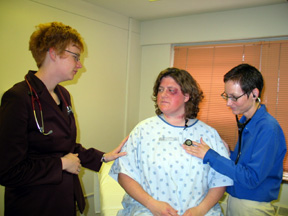 |
UNMC medical students, Paula Muegge, far left, and Patti Otis, far right, assess a simulated domestic abuse victim. The victim is played by Leslie Crook, a UNMC employee who teaches emergency medicine courses and a volunteer with the Domestic Violence Coordinating Council. |
Paula Muegge and Patti Otis took the elective course, “Bio-psychosocial Perspective on Domestic Violence,” and finished their training with a clinical assessment of a simulated patient who presented with symptoms of physical abuse.
The students developed knowledge and skills to recognize and assist with intervention of domestic violence situations. Training included visits to domestic abuse shelters where they performed medical evaluations.
Sue Michalski, training and education director, Domestic Violence Coordinating Council, spearheaded the effort to make the new elective course available in the state. UNMC students are the first in the state to participate in the course.
“Physicians play a key role in identifying and referring domestic abuse victims,” Michalski said. “A victim may divulge abuse to a physician before they tell someone else. Physicians also are critical to potential prosecution of cases.”
The students hope the training broadens their skills so when presented with domestic abuse cases they can be more effective in helping victims.
“We haven’t had a lot of exposure to domestic violence,” said Muegge, a fourth-year medical student who will specialize in internal medicine. “This was a chance to learn more and become advocates for women or men.”
Following the mock patient visit at UNMC, students spent time at a mock trial at the Douglas County Courthouse.
Bob Muelleman, M.D., UNMC professor of surgery and emergency medicine and section chief, emergency medicine, The Nebraska Medical Center, has published medical studies on domestic violence.
“I think this training will give a better understanding on the role of the physician in domestic abuse,” Dr. Muelleman said. “It’s important to ask the right questions and document in the medical record properly. The more clinicians know about the resources in the community, the more they will be able to tell people what their options are.
“If you ask in a sensitive manner, a woman may be willing to talk about it and may want to hear about her options, or at least, we’ve planted the seed,” he said.